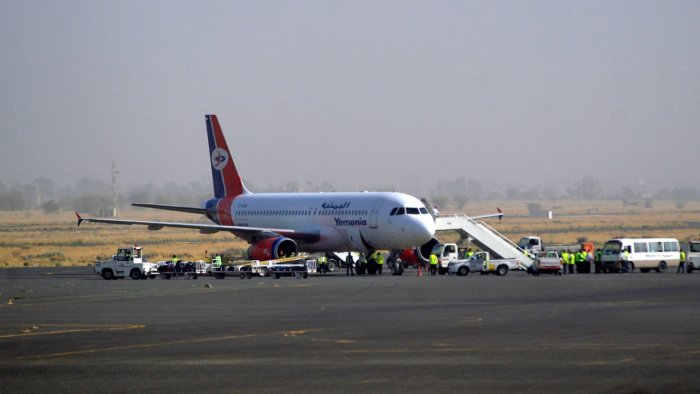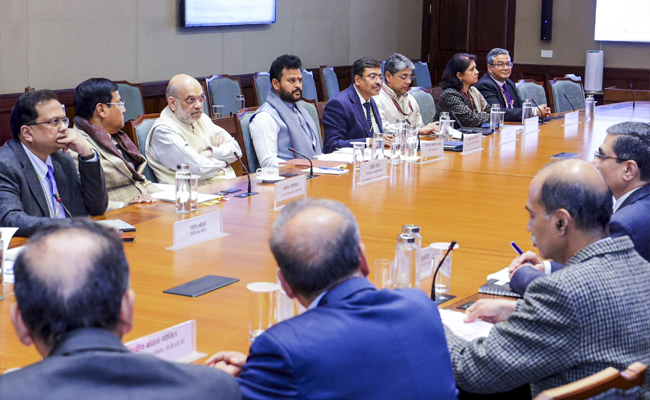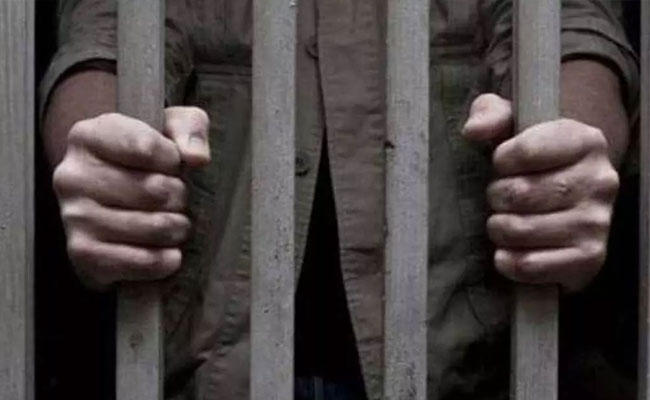Sanaa, May 16: The first commercial flight in six years took off from Yemen's rebel-held capital on Monday, officials said, part of a fragile truce in the county's grinding civil war.
The Yemen Airways flight, with 151 passengers on board, was bound for Jordan's capital of Amman, according to media outlets run by the Iran-backed Houthi rebels.
Earlier, the plane had arrived in Sanaa from the southern port city of Aden to pick up the passengers. On touchdown, it was welcomed by a ceremonial water salute, according to a video posted online by the national carrier.
The Houthi media office said a return flight was expected back in Sanaa from Amman later Monday.
For Wednesday, Yemen Airways announced another flight from Sanaa to Amman and a return one to the Yemeni capital.
The flight is part of the U.N.-brokered, 60-day truce agreement that the internationally recognised government and the Houthi rebels struck last month.
The truce, which went into effect on April 2, is the first nationwide cease-fire in Yemen in six years.
The truce accord calls for two commercial flights a week to and from Sanaa to Jordan and Egypt.
The Houthi-held Sanaa is blockaded by the Saudi-led coalition, which backs the internationally recognised government.
The closure of the airport has inflicted major economic and humanitarian damage thousands of people had lost their jobs as businesses providing services closed down or suffered heavy losses.
Before the blockade, the Sanaa airport had an estimated of 6,000 passengers a day, and more than 2 million passengers every year, according to the Norwegian Refugee Council, an international charity working in Yemen.
The U.N. envoy for Yemen, Hans Grundberg, hailed what he described as constructive cooperation of the Yemeni government.
This should be a moment of coming together to do more, to start repairing what the war has broken, he said in a statement.
He urged both parties to implement all truce commitments and move towards resuming a political process to sustainably end the conflict.
The flight was initially due to take off on April 2 but a dispute over passports issued by the Houthis had delayed the departure date. This time, the internationally recognized government allowed passengers with Houthi-issued documents to board the flight.
The government-run SABA news agency said last week that new Yemeni passports would be issued in Jordan for those arriving with Houthi-issued travel documents.
Erin Hutchinson, Yemen director at the Norwegian Refugee Council, said the take-off of the first flight was a stepping stone towards a lasting peace for Yemen.
The long overdue reopening of the airport was one of the major objectives of the truce," she said, urging warring parties to work towards implementing other elements of the deal, including reopening of roads around Taiz and other provinces.
Taiz, which remains partially held by the forces fighting on behalf of the government, has been blockaded by the Houthis since 2016.
The U.N. envoy met last month with the government delegation to prepare for meetings on reopening roads in Taiz and other provinces. The Houthis have yet to name their delegation to the road-reopening meeting, raising concerns about their commitment to lifting the blockade.
A Houthi spokesman did not respond to repeated requests for comment.
The truce also included allowing 18 vessels carrying fuel into the Red Sea port of Hodeida, which is controlled by the Houthis, over a two-month period.
The cease-fire came amid concerted international and regional efforts to find a settlement to the conflict that has devastated the Arab world's poorest country and pushed it to the brink of famine.
Yemen's civil war erupted in 2014, when the Houthis seized the capital, Sanaa, and forced the government into exile.
The Saudi-led coalition entered the war in early 2015 to try restore the government to power.
Despite daily violations reported by both sides, major ground and air clashes have subsided and the rebels have stopped their cross-border attacks on Saudi Arabia and the United Arab Emirates, another pillar of the anti-Houthi coalition.
Let the Truth be known. If you read VB and like VB, please be a VB Supporter and Help us deliver the Truth to one and all.
New Delhi (PTI): To beef up the security infrastructure of ports, the government will set up a statutory body -- the Bureau of Port Security -- that will ensure timely analysis, collection and exchange of security-related information of ports and vessels, officials said on Friday.
Union Home Minister Amit Shah on Thursday convened a meeting for the constitution of the dedicated body, the Bureau of Port Security (BoPS), which was attended by the Minister of Ports, Shipping and Waterways, Sarbananda Sonowal, and the Minister of Civil Aviation, Ram Mohan Naidu, an official statement said.
Emphasising that there is a need to establish a country-wide robust port security framework, Shah directed that security measures should be implemented in a graded and risk-based manner, taking into account vulnerabilities, trade potential, location, and other relevant parameters.
ALSO READ: Four arrested in cattle theft case after encounter in UP's Kaushambi
The meeting also noted that lessons learned from the maritime security framework shall be replicated in the aviation security domain, the statement said.
The new body, modelled on the lines of the Bureau of Civil Aviation Security (BCAS), will be constituted as a statutory body under the new Merchant Shipping Act, 2025, and will work under the aegis of the Ministry of Ports, Shipping and Waterways (MoPSW), it said.
Headed by a senior IPS officer as its director general, the BoPS will be responsible for regulatory and oversight functions relating to the security of ships and port facilities.
"During the transition period of one year, the director general of shipping shall function as the director general of BoPS," the statement said.
"The BoPS will ensure timely analysis, collection and exchange of security-related information, with a special focus on cybersecurity, including a dedicated division to safeguard port IT infrastructure from digital threats," it said.
The government has designated the Central Industrial Security Force (CISF) as a recognised security organisation (RSO), responsible for undertaking security assessments and preparation of security plans for port facilities.
The Central Armed Police Force (CAPF) will train and build the capacities of private security agencies (PSAs) engaged in port security.
"These agencies shall be certified and appropriate regulatory measures shall be introduced to ensure that only the licensed PSAs operate in this sector," the statement said.





